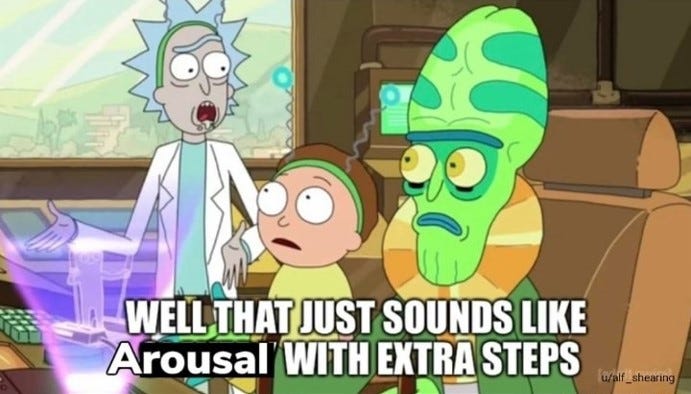Monday BS #11: 15.11.21
On connection, taking back control and climacophilia
Monday BSers,
Those of you on the ball noticed that I didn’t publish last week as family holiday removed me temporarily from the quill and ink. I may continue to leave gaps between publications so everyone has time to enjoy it; and sometimes extra thinking time suits me too!
The podcasts are going from strength to strength. Following the launch of my mini-series on sport with Gary Lineker last week, I’m delighted to share that Henry Winter, Chief Football Writer at The Times will be joining me to talk A Load of BS. Before that, this coming Thursday, I’ll be sharing my interview with fellow Times parishioner, political commentator and former Conservative Party adviser Danny Finkelstein.
If you haven’t got A Load of BS in your life yet, please subscribe here:
This week’s Monday BS gives you a melange of amuse-bouche to sit alongside the cornflakes. Firstly, I’m delighted that friend and recent BS alumnus Gerald Ashley is sharing some thoughts on the risks of over connection.
Following, I’m talking about work meeting bugbears and tangible tactics to overcome them; and then in a neat segue, having an orgasm tumbling down a staircase (not me I should add). Both of these are tasters of fresh interviews to come with the irrepressible Nir Eyal and the erudite, quick witted Dr Jesse Bering.
Enjoy!
Guest contribution by Gerald Ashley (link to his blog for other writings)
1) Brittle New World
It is commonplace to observe that we live in an “ever more connected” world, but are we reaching a point where we are exposed to serious risks by being over-connected?
The history of human progress illustrates how many of our greatest breakthroughs have been through advances in communication and the desire to link up, whether as individuals or organisations. From printing to the telegraph, to flying and the ability to transmit data around the globe in a flash – all have advanced trade, wealth and a general feeling of progress. But now we seem to be on the cusp of a myriad of technologies that will massively increase our connectivity, and also with the potential for serious risks if not disasters.
In little more than 30 years the internet has grown from a small exclusive network to an all pervading channel for much of our lives. For the first time in human history we can now connect to a vast global network – already half the world’s population is on the net, and this will only increase. At first this connectivity brought the usual risks associated with communication; operational failures, exposure to potential fraud and the need to invest heavily in new technology, business systems and knowledgeable staff. But now the risk profile has subtly changed, the network itself, whilst a carrier of great efficiency and potential wealth, is also a risk itself.
The simple diagram below shows the danger of “over-connectivity”. Here we can see as connections increase in a network, it becomes more resilient (moving from randomness to organisation) however diminishing marginal returns eventually kick in and the network becomes stressed, brittle and ultimately prone to complete collapse. We can think of this a bit like having too many dominoes too closely together – so if one domino should fall?
For those involved in risk taking and decision making, the study of Complex Systems science is going to be an important element in understanding and mitigating these future risks. Complexity looks at networks and their agents and crucially seeks to understand the flows around the network and how small changes can have very large effects. Many of our new business networks, whether electronic systems, management systems or actual infrastructure (e.g. power supply) are now at risk of moving from stable resilience to being stressed and vulnerable. Whether it be risks of an “electronic hurricane” from cyber attacks or the unthinking connections being rolled out in the “Internet of Things”, we need to be aware of the consequences.
So what to do?
Policymakers, military planners, business people and individuals need to have a much clearer idea of networks and their inherent weaknesses, and their own exposures to networks that might be overly connected or overly optimised. Far too many organisations have no deep understanding of their own networks let alone those of others to which they are exposed. This is particularly true where firms have merged and there is no end to end complete analysis of the business. Network resilience testing should be the core of operational risk management and using the new analysis techniques that are coming from biology and physics via Complex Systems science.
Sensible mediation can be pretty straightforward. It really is a case of building in gaps and circuit breakers into any system…these come however with a cost (in both monetary and short term efficiency terms) but are essential to avoid heightened vulnerabilities. Whether we are planning large complex networks or happily hooking up our fridge to the net, this whole area of network resilience is becoming of vital importance.
Suggested Further Reading
The Tangled World: Understanding Human Connections, Networks and Complexity, by Gerald Ashley & Terry Lloyd
Positive Linking: How Networks Can Revolutionise the World, by Paul Ormerod
2) Take back control
Work meetings are a terrible bugbear; more so virtually when they are so quick and easy to schedule. Do you receive a handful of ‘Catch-up’ invitations every week? If so, do you challenge back and demand a purpose and desired outcome?
That’s damn hard if a superior requests it, but, as you might sense from where this is heading, there is a parachute to freedom from this tiresome tyranny. I interviewed Distractions superhero Nir Eyal last week for A Load of BS (not yet published) and his premier time management advice in this scenario is to spend 10 minutes with your boss every week to share which projects (and indeed meetings) you’ll be devoting time to that week; and by consequence what remains in the parking lot.
Your boss will love you, by the way, as most tend not to want to proactively micro manage.
Nir turned my thinking on the generic purpose of meetings. Too many meetings are ‘catch up’ or ‘planning’ - Nir says the only purpose of a meeting is gaining consensus. I think there are exceptions but the point is the meeting proposer should recommend in advance, not expect colleagues to do the thinking in the meeting. The supposed unrestraint and creativity of brainstorming sessions are wildly overrated.
At Amazon, the lead arrives at their meeting with a memo for all participants to read. I shall be testing the approach this week.
3) Coming down the stairs
Here are some unusual, unexpected behaviours for you. In another plug for an upcoming interview, my conversation with experimental psychologist Dr Jesse Bering revealed some unexpected facets of human (and non-human) perversion.
The word pervert has changed etymologically over the last 200 years. It was originally associated with atheism and had nothing to do with sexuality. It was a question of going against what was right. Connotations of sexual deviance came with the sexologists of the late Victorian era. More of the history in the podcast!
Due to the obvious difficulty in measuring how fetishes work in humans, Jesse shared a fascinating experiment in rat pup development in which the mother rat’s teats were coated with lemon scent. When the male pups grew up, they were only able to be aroused and ejaculate with female rats who carried the lemon scent. The female pups were unaffected; it was only the males whose sexual arousal was shaped by those early experiences.
Make sure to tune into the podcast to catch the full story, and what this says about human sexuality and preponderance to fetishes.
Beyond common fetishes like feet, one of the more niche is climacophilia which refers to gaining sexual gratification from falling down the stairs (yes, it has a name). Incredulous you may be, but the searching question is how does one activate such arousal?
Halfway down, is there a moment of ecstasy and joy before, bruised and bushed at the bottom, one lights a cigarette?
Presumably the longer the staircase the better. We humans are an odd bunch.
Till next time.
If you like what you’re reading, why not share with a friend or even on Twitter and tell the world.
Have a great week! 😃
Daniel








